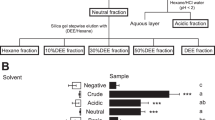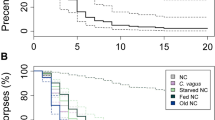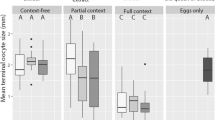Abstract
OUR observations of laboratory colonies of the fire ant, Solenopsis saevissima (F. Smith), suggest that care of the immature forms by the workers might be influenced by secretions from the immature forms. Recognition of the immature forms and their care by workers might thus be associated with these secretions. Watkins and Cole1 noted that worker army ants, Neivamyrmex opacithorax Emery, were attracted to secretions of their larvae and pupae. This letter presents the results of studies we have made on the response of worker fire ants to extracts of their brood.
This is a preview of subscription content, access via your institution
Access options
Subscribe to this journal
Receive 51 print issues and online access
$199.00 per year
only $3.90 per issue
Buy this article
- Purchase on Springer Link
- Instant access to full article PDF
Prices may be subject to local taxes which are calculated during checkout
Similar content being viewed by others
References
Watkins, J. F., and Cole, T. W., Texas J. Sci., 18, 254 (1966).
Author information
Authors and Affiliations
Rights and permissions
About this article
Cite this article
GLANCEY, B., STRINGER, C., CRAIG, C. et al. Pheromone may induce Brood Tending in the Fire Ant, Solenopsis saevissima. Nature 226, 863–864 (1970). https://doi.org/10.1038/226863a0
Received:
Revised:
Issue Date:
DOI: https://doi.org/10.1038/226863a0
This article is cited by
-
Brood recognition and discrimination in ants
Insectes Sociaux (2020)
-
Increasing Attractiveness of Baits with Venom Gland Extract for Atta sexdens rubropilosa (Forel) (Hymenoptera: Formicidae)
Neotropical Entomology (2012)
-
Functional subcaste discrimination (foragers and brood-tenders) in the antCamponotus vagus scop.: polymorphism of cuticular hydrocarbon patterns
Journal of Chemical Ecology (1993)
-
Pupal cell-building behavior in passalid beetles (Coleoptera: Passalidae)
Journal of Insect Behavior (1993)
-
Behavioral and electrophysiological studies with live larvae and larval rinses of the red imported fire ant,Solenopsis invicta Buren (Hymenoptera: Formicidae)
Journal of Chemical Ecology (1988)
Comments
By submitting a comment you agree to abide by our Terms and Community Guidelines. If you find something abusive or that does not comply with our terms or guidelines please flag it as inappropriate.



